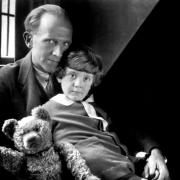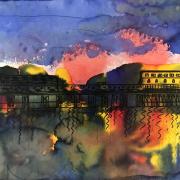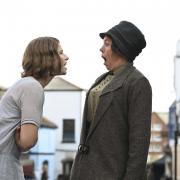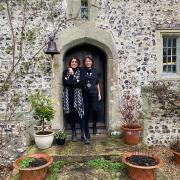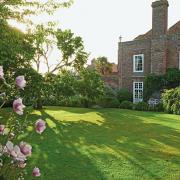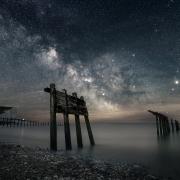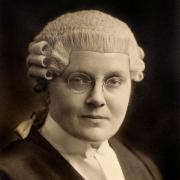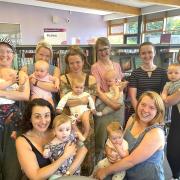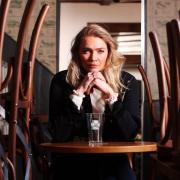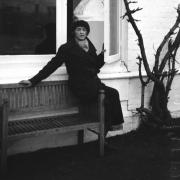Juliet Nicolson, the granddaughter of Vita Sackville-West, cherished her idyllic childhood at Sissinghurst Castle in Kent, but feared taking up the pen and following in her family's literary footsteps...
Juliet Nicolson, you might imagine, was born to write. As the granddaughter of the poet and novelist Vita Sackville-West and the diarist, historian and politician Harold Nicolson – not to mention the daughter of the writer Nigel Nicolson and sister of the acclaimed historian Adam Nicolson – many assumed that she, too, would pick up the pen. But she firmly resisted the idea.
"Write a book?" she exclaims. "If anyone ever suggested it, I’d say: ‘Are you mad? The rest of the family do that.’ To be honest, they’d set the standard so high I didn’t have any inclination."
But something changed. She was asked to help Lady Annabel Goldsmith research her memoirs and found it so invigorating she wondered what she’d been missing. She set to work, and her first book, The Perfect Summer, chronicling the long hot summer of 1911 when Britain was on the brink of seismic change, became an instant bestseller. She followed it up with The Great Silence, examining the aftermath of the First World War.
Now she’s written her debut novel, Abdication, which charts the tortured love affair between Edward VIII and his American mistress Wallis Simpson. Though The King’s Speech and Madonna’s recent biopic W.E. have mined this topic pretty extensively, she prefers to see her novel as timely. "None of these things were out when I started researching, but my publishers are of the opinion that the more, the merrier," she says robustly.
She is speaking from the charming 17th Century farmhouse she shares with her second husband Charles Anson, a former press secretary to the Queen, on the outskirts of Alfriston. They moved in shortly after their marriage three years ago, chiefly attracted by the exquisite dovecote in the garden which had remained untouched since the 1600s.
There’s something beguilingly girlish about Juliet, 57, and a sense of impish mischief is never far from the surface. With her long face and deeply sunken eyes, she is a Nicolson through and through – something she cheerfully acknowledges when she bemoans the fact that she has inherited the Nicolson nose.
But you won’t catch her grumbling about her inheritance for long. "From the word go, I was aware that there was something extraordinarily special about living at Sissinghurst," she says of her childhood home, famous for the breathtaking gardens created by her grandparents in the grounds of Sissinghurst Castle.
She and her younger brother Adam moved there after Vita’s death in 1962. "It was all freedom, bicycles and openness," she recalls. "And whenever I go there, I crouch to the level of the box hedge in the White Garden (my seven-year-old height), run my fingers along the featheriness of the top and am immediately returned to the past."
The National Trust arrived in 1968, when financial pressures persuaded her father to bequeath Sissinghurst to the nation, though not before shrewdly adding a clause which enabled the family to remain there in perpetuity. "For a long time, nothing changed," says Juliet. "We still biked about and tried to drop eggs on people’s heads from the tower. It didn’t feel as policed as one might imagine. Down in the woods, we were still having boat races in the stream. It was heaven."
Her memories of her grandparents are equally vivid. "I was seven when Vita died, but we often visited. On the last occasion, when she was very ill, Adam and I had learnt how to do the Twist, which we knew began by pretending to stub out a cigarette with your right foot. For the first time in her life Vita was completely enchanted with us. That was in April and she died in June."
But though affectionate on paper, Vita was physically undemonstrative. "I have a photograph of Vita and me. And I’m sitting at one end of a bench and Vita is as far away as she can possibly get at the other. It’s clearly not a grandmotherly pose," laughs Juliet.
In contrast, she doted on her grandfather, who wrote them "naughty" letters and dared them to do outrageous things. "He was an absolute joy. He would jump into our paddling pool with his shoes and socks on, and light our candy cigarettes with his lighter. But he was heartbroken when Vita died and would cry often and loudly in the garden when he thought no one was around."
Sadly, the family unit disbanded when Juliet’s parents divorced. By this time, she was already boarding at Benenden and later read English at St Hugh’s College, Oxford before embarking on a career in publishing PR. Marriage to financier James Macmillan-Scott followed swiftly after and they had two daughters, Clemmie and Flora. His work took them to New York, but when the marriage dissolved ten years later, she returned, aged 40, to the cradle of Sissinghurst.
It became her refuge, though when her daughters flew the nest she was forced to confront her isolation. Her marriage break-up had left her unconfident and she decided that she would never again expose herself to such levels of risk. Everything changed, however, when she was invited to a book launch. As she stepped nervously into the room, her eyes were drawn to a striking man who fixed her with a look of such intensity that her heart lurched. They were introduced and talked endlessly for the rest of the evening.
That man, of course, was Charles, a former diplomat now working as a communications consultant, who had been married before and had grown-up children. They met again, friendship blossomed into love, and they were finally wed at the 15th Century flint church at Berwick, near Alfriston.
"It moves me so much, this whole sense of second chances," says Juliet, growing emotional. "I began to think: ‘Is this it? Is my romantic life over? Or is my second chance being able to write?’ I don’t think I’d held anybody’s hand for a decade, but then along came Charlie when I was least expecting it."
Writing has been her other great comfort; her chosen period that Downton Abbey era so beloved of film-makers. Juliet is interested in the marginal times surrounding the great periods of history – the pregnant moments before the cataclysm; the desolate silence after it. A social historian, she accords herself the imaginative licence of a novelist, and like many of her female counterparts it’s the domestic detail that absorbs her rather than the broad sweep of history.
"It’s so often in the detail that the truth lies," she says, revealing that she immerses herself in the sensibility of the period by leafing through daily copies of The Times – from the ads and the weather reports to the situations vacant.
Her latest book about the abdication has required just as much dedication, though she felt she could get even closer to these historic events by placing a fictional character at the centre of the action. And why this subject? "Well, it remains difficult to understand why this popular new king, who could have had any beautiful princess on the planet, chose to turn his back on the throne for an unattractive, twice married American rake," she says. "What was it about her? There’s always been speculation, but people want answers. Wallis tried very hard to get out of the marriage, but it was too late. It was a case of be careful what you wish for."
As for Juliet, she has more than she could possibly wish for – and moving to Alfriston has been the icing on the cake. "It’s an extraordinarily vital village and the friendliest community I have ever encountered. As soon as we arrived, people made themselves indispensable to us and I’ve made more friends in these three years than at any time in my life.
"Our situation is also beautiful. Even jaded people with jaded views of life are taken aback by the beauty of this place and I bless myself constantly. We’re absolute bores about congratulating ourselves."



